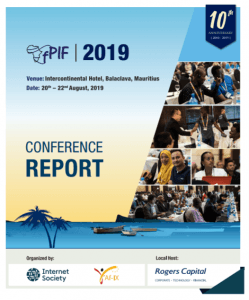AfPIF Celebrates Ten Year Anniversary, Future Looks Bright
The tenth edition of Africa’s premier Internet technology forum on peering and network interconnection was held in Balaclava, Mauritius, with a commitment to continue investments that guarantee improved interconnectivity and lower costs for end users within the region.
The past decade has seen significant developments in the Internet sector; from the deployment of local, national, and cross-border fibre-optic networks to a 456,860% increase in total traffic exchanged locally. The goal of exchanging 80% of the content locally by 2020 remains in sight and will be discussed at next year’s AfPIF forum in Kigali, Rwanda.
It was fitting that the tenth edition of AfPIF was held in Mauritius; a country anchored firmly by technology. At the turn of the century, Mauritius was dependent on agriculture, but has since embraced opportunities in technology to become a leader in fintech and cybersecurity. As a result, it has become the preferred headquarters for many technology companies investing in Africa.
To some extent, Mauritius highlights what African countries could become if they made efforts to attract more technology investments through a favorable regulatory environment, attractive tax regime, investment in technology infrastructure, and an educated workforce capable of serving the needs of the future.
367 Participants
Representing 59 countries: 202 from Africa, 36 from Europe, 16 from America, and 13 from Asia
456,860%
Increase in total traffic exchanged locally in the past decade
Infrastructure is still a priority, though at a different level
Ten years ago, countries were looking to set up primary infrastructure; the first submarine cable or the first terrestrial network. Today, countries are looking for ways to further reduce costs and interconnect between different cities. For instance, the Indian Ocean Islands are looking to lay a third cable that interconnects them and terminates in Durban, South Africa.
Global carriers have taken note
Akamai, AWS, Facebook, Google, Netflix, and Microsoft are some of the global players that sponsored AfPIF this year. Asian players such as China Telecom were also represented, showing a growing recognition from America, Europe and Asia.
Data Center growth key to content hosting
Continued dialogue between content creators, hosts and data center providers has led to better understanding of what needs to be done to achieve 80% local traffic exchange by 2020.
Innovation is the key to the future
Presentation on how Africa looks in 2030 identified innovation as key to continuous growth and relevance. As customers become more aware and demand better services, organizations will have to evolve and adapt to better suit the customer.
The benefits of an IXP are not disputed
Previously, the benefit of an IXP may have been seen mainly in the capacity and the number of CDNs or caching networks present. The debate has now moved to the value created in the particular ecosystem, whether its spurring innovation, e-commerce or access to faster government services within a country.
Operators have found new ways to add value to the ecosystem and attract new players in the market, without dwelling so much on the capacity exchanged.
New hubs will emerge as more people get online
With the cost of connectivity falling and more people coming online, it is expected that new hubs will emerge, as Africa looks for new ways to interconnect, as new data centers come up in new cities, and as terrestrial and submarine cable routes influence the location of future hubs.
The role of the traditional telco is changing
It may have been very attractive in the last ten years, but the business of providing mere infrastructure is slowly losing its lustre. Companies that are providing just pipes are now under pressure, as content remains local and the demand and pricing for international transit falls in more advanced markets like South Africa.
Companies are now being forced to look to other underdeveloped markets or offer more innovative products that can allow more competition with more demanding customers.
